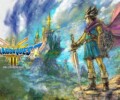
Developer: SideQuest Studios
Publisher: EastAsiaSoft
Platform: PS4, PS3, PS Vita, Switch
Tested on: Switch
Rainbow Skies (Switch) – Review
Way back in 2012, SideQuest Studios released a little JRPG titled Rainbow Moon on the then-current family of PlayStation systems, the PS3, PS4, and the Vita. The game proved to be moderately successful, becoming a cult classic, and six years later, it got a sequel, Rainbow Skies. By that point, the PS3 was all but dead, and the Vita was on life support, so not many people played Rainbow Skies, and if they did, it was on PS4. Publisher EastAsiaSoft must have reasoned that this lesser-known sequel to Rainbow Moon deserved a second chance, as the game has made the jump to the Switch. Surprisingly, its better-known predecessor hasn’t. Since we’ve never played Rainbow Moon, we can’t judge how well the sequel sizes up to it. As such, we’re looking at Rainbow Skies as a standalone release, something we imagine many Switch players will do. How does the game hold up five years after its debut?
Story
The opening chapter of Rainbow Skies is set in the flying city of Arca, where players will meet Damion, who is a monster tamer apprentice and one of our protagonists. He is about to take on the final test to become a full-fledged monster tamer. As you’d expect, things go wrong, not in the least because of Damion’s careless attitude. Our foolhardy hero and his companion, Layne, end up falling from the city, seemingly to their deaths. It’s at this point in the story that our perspective shifts to the continent of Lunah, where we meet Ashly. She is a young magician whose goal is to master a spell that allows her to take control of monsters. She stumbles upon Damion and Layne, and due to a series of spell-related mishaps, the trio of Damion, Layne, and Ashly end up magically bonded to one another. Now, this unwilling band of characters must travel halfway around the world to find the counterspell that allows them to break their bond.
Now, this plotline could have formed the basis for an engaging small-scale RPG story that sees the characters grow closer to one another, with the heartwarming conclusion that our trio finds that in attempting to break the magical bond, they’ve instead forged a bond of friendship. Unfortunately, that isn’t the case here, for two very distinct reasons. The first one is story-related: around halfway into the game’s narrative, a major new story arc is introduced, which pretty much overtakes everything that happened up to that point. That story arc involves a threat that is about to destroy the entire world unless our heroes put a stop to it. This dramatic narrative shift would have been fine, if a bit cliché, but Rainbow Skies’ other big issue is just how poorly written everything is. The dialogue is stilted and unnatural, the attempts at jokes fall flat, either relying on vulgarity or breaking the fourth wall, and the characters are generally unlikeable. It’s a shame because Rainbow Skies is a character-driven game, especially in its first half, and by the time the second half comes around, you simply won’t care enough about what happens to the cast.
Graphics
Given that Rainbow Skies was essentially designed as a PS Vita title that happened to be playable on PS4, our expectations for the visuals weren’t stellar, but even so, we couldn’t help but end up disappointed with how the game presented itself. Assets are reused wherever possible, so enemies, NPCs, and even environments lack personality. Colors are oversaturated, to the point that everything looks like plastic. Character animations are janky and look dated. We’d go as far as to say that Rainbow Skies looks like something you’d expect to see in those annoying ads for free-to-play mobile RPGs.
Sound
With unappealing visuals and poor writing, Rainbow Skies needs to rely on its soundscape as a crutch to build up at least some atmosphere, with mixed results. We actually quite enjoyed the varied OST, which proved to be a rare highlight during our time with the game. Voice acting is present but limited to a handful of samples. Sound effects are repeated ad nauseam as you keep spamming attacks over and over again. If it wasn’t for the music, Rainbow Skies’ audio would have been as dismissable as much of the rest of the game.
Gameplay
Although Rainbow Skies originally debuted in 2018, the gameplay feels much more archaic, and not necessarily in a good way. There are of course plenty of modern JPRGs that intentionally take inspiration from “old school” titles, like Chained Echoes or Cris Tales. Any similarities that Rainbow Skies may have to those games are, unfortunately, purely coincidental. This isn’t a love letter or homage to the classics of yesteryear but a run-of-the-mill JRPG that fails to grasp why people enjoy playing JPRGs in the first place. Admittedly, there is plenty of content here, with the main story gobbling up upwards of thirty hours of your time, but unfortunately, most of that content feels like filler. In this regard, perhaps SideQuest Studios should have taken a page from Square Enix’s book and added a fast-forward function to this re-release, similar to what we’ve seen in Romancing SaGa and Chrono Cross.
From the get-go, Rainbow Skies feels like a slog. The stilted dialogue drags on and navigating the overworld is atrociously slow. Even the combat system, which is admittedly the most interesting element here, doesn’t do enough to save a JRPG that is outright dull and boring. This isn’t one of those games that is ‘so bad it’s good’. Rainbow Skies feels more like a chore than like entertainment. Admittedly, we didn’t run into any glitches or major bugs during our time with the game, but that may have more to do with the game being built around a very simple framework in the first place.
Battles take place on a grid-based map, where you’ll not only take control of Damion, Layne, and Ashly, but any monster companions they have tamed as well. There is a Pokémon-like aspect here, with different monsters you can collect. Battles are turn-based, with characters acting in order of their speed stat. Each character has a limited number of actions, and moving around the battlefield counts as an action. Your best bet is relying on ranged attacks so that you don’t have to waste precious action points to reposition yourself. One thing we would have liked to have seen here was more battlefield variety and environmental obstacles, as battles now tend to play out in the same way once you find a strategy that works. Unfortunately, this also means that the more powerful moves you unlock as you level up your characters are pretty much useless in random encounters. Setting these up just takes too much time and preparation, and taking down low-level enemies is done much faster by spamming weak moves. Consequently, you’ll likely only see these moves come into play in boss battles.
If you’re a glutton for punishment, you can tackle Rainbow Skies at various difficulties. The game does have an interesting and unusual approach to its difficulty levels. Rather than simply choosing between ‘easy’, ‘normal’, and ‘hard’ modes, you have the option to increase the difficulty level when you visit specific cities and have met certain criteria, such as having completed a set number of battles. It’s an original idea that would have been a fantastic addition if the game wasn’t a boring grindfest in the first place and if the battles themselves had offered a Triangle Strategy level of strategy. In practice, increasing the difficulty only means you’ll have to grind more, and battles are dragged out just a bit longer. Rainbow Skies isn’t a very challenging game in the first place. It’s just repetitive, and all the difficulty increases seem to do is draw out that feeling of repetition even further.
Conclusion
At a €19.99 price point, Rainbow Skies doesn’t exactly break the bank and you’re definitely getting plenty of bang for your buck in terms of game length. It’s a shame then that the content that’s present here just isn’t very good. The least we can say is that Rainbow Skies is a functional game, as we didn’t run into any performance issues. That said, the combat system never got a chance to shine, the story and the characters failed to grasp our attention, and the audiovisual presentation has aged like milk.
1 Comment
Leave a Reply
You must be logged in to post a comment.










[…] year, EastAsiaSoft treated us to a remaster of Rainbow Skies, a JRPG developed by SideQuest Studios that debuted on PS3, PS4, and PSVita in 2018. Rainbow Skies […]